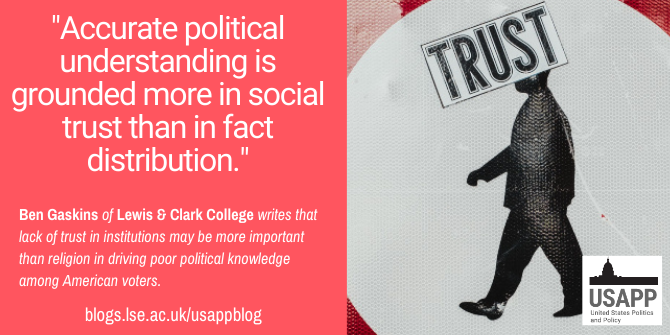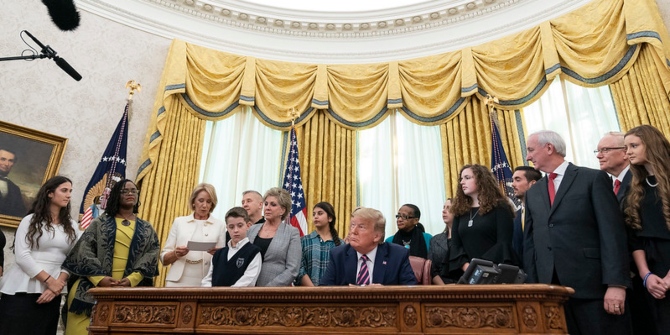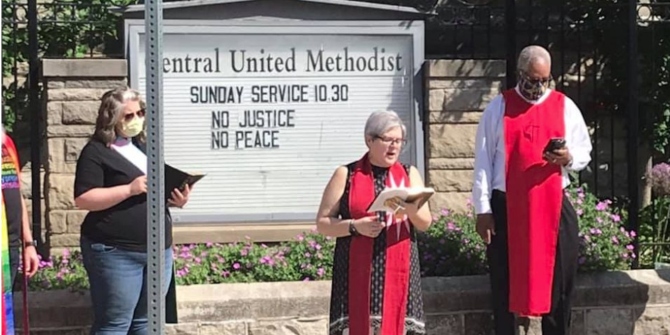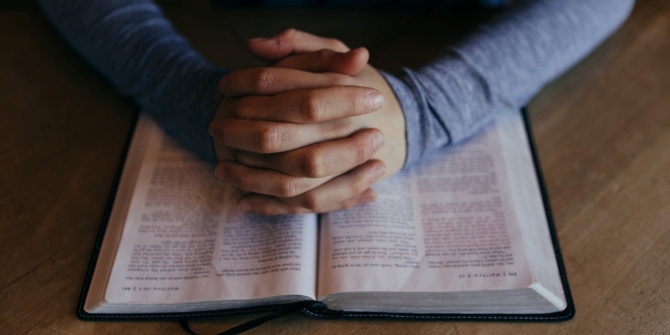 Many commentators are concerned about the apparent lack of political knowledge and civic awareness among American voters. Ben Gaskins looks at some of the drivers of civic awareness, including the influence of religious identity, beliefs, and institutions. He writes that political knowledge is not just about exposure to facts but also people’s willingness to trust their sources. Highly religious Americans, he finds, are generally not any less politically aware than the non-religious, but they are more likely to reject certain types of facts from secular sources because of their distrust for mainstream media outlets.
Many commentators are concerned about the apparent lack of political knowledge and civic awareness among American voters. Ben Gaskins looks at some of the drivers of civic awareness, including the influence of religious identity, beliefs, and institutions. He writes that political knowledge is not just about exposure to facts but also people’s willingness to trust their sources. Highly religious Americans, he finds, are generally not any less politically aware than the non-religious, but they are more likely to reject certain types of facts from secular sources because of their distrust for mainstream media outlets.
- On 15 June 2021, LSE Religion and Global Society (RGS), together with the US Centre and Department of International Relations, hosted an LSE Public Lecture, Religious Freedom under the Biden Administration. In conjunction with that event, RGS and the US Centre’s USAPP Blog have launched a joint series focusing on religion in American society, bringing in experts to explore the relationship different faith groups have with American society. Read other posts in this series.
One of the most common laments in American politics is that, despite increased overall educational attainment, the general public has an embarrassing lack of civic awareness and political knowledge. Indeed, a recent survey shows that only one third of US adults know how long Congressional terms are, and just over half could name all three branches of government (though on the positive side, this is twice the rate of four years ago, with recent anxiety-producing events inducing increased attention to national politics). This general political ignorance provides fodder for comedians, pundits, and scholars—for whom political knowledge is commonly seen as the “currency of citizenship”. An uninformed electorate finds it more difficult to translate their preferences into accurate vote choices and differs from what they would want if they were only more informed. Further, levels of political knowledge reinforce various societal divides, including education, race, gender, class, and religion.
On the right, political ignorance is often used to justify restrictions on the franchise, ignore majority preferences, and oppose making political participation easier, especially for groups that traditionally possess lower levels of political knowledge of the type asked on national surveys: namely, the young, minorities, and socio-economically disadvantaged people. The left, on the other hand, bemoans anti-intellectualism and conspiracy-mindedness on the right for undermining democracy, with conservative religious figures and institutions often specifically targeted for blame. Focusing on this latter critique, what does the evidence say? Are religious Americans less knowledgeable about politics? And if so, how does this affect American politics?
We don’t know what makes a citizen know about politics
As I discuss in my 2019 research, the scholarly evidence regarding the effect of religion on political knowledge is quite mixed. While there is an overall negative relationship between religious adherence and education levels, this relationship does not hold among Christians. Looking at general political awareness, there is lots of variation between particular religious traditions and political knowledge, though again it is not apparent that religiosity either increases or decreases overall knowledge.
One reason for the mixed results is that scholars don’t agree on what makes a citizen knowledgeable, with many types of political knowledge questions potentially tapping into this concept. So-called “general” facts refer to the players and rules of the game. For instance, who is the Secretary of State? How many votes does it take to break a Senate filibuster? Compare this to policy-specific facts, which have to do with governmental actions and their consequences. Further complicating this dichotomy is the temporal element. Some facts (i.e., How many branches of government are there?) can be learned as a child, while others require careful surveillance of current affairs to know. Not everyone pays attention to the monthly jobs report, but an accurate understanding of political realities such as the unemployment rate will help citizens hold leaders accountable for their actions and the outcomes they produce.
If political ignorance is such a detriment to American democracy, then the most commonly-articulated solution revolves around civic education, ensuring that children are properly educated about their government, history, and politics. Hence the ongoing battles about what “properly educated” actually means, especially as it involves race and racism. While early education is undoubtedly important, a larger problem arises from how political facts are learned outside of the classroom. After all, if accurate information for surveillance issues requires attention to the media, then those who distrust the media will be less likely to learn about those topics, regardless of how educated or knowledgeable those people are of general political figures. One may love or hate Nancy Pelosi and still be able to recall that she is the Speaker of the House, but the willingness to trust the news will affect knowing whether she supports or opposes, for example, Medicare for All. Political knowledge is not just about being exposed to facts and the ability to learn but is dependent on the willingness to trust the sources of those facts and the outlets that convey that information.
Religion and political trust
One of the most important things to understand about political knowledge is that facts themselves are intensely contentious and political. Facts that run counter to one’s predispositions are harder to learn and recall compared to facts that fit neatly into one’s worldview. Whether the topic is inflation rates, employment figures, COVID-19 cases, or any other political issue, partisans want to be able to bolster their political identities and attitudes. In our increasingly polarized world (not just in terms of policy but in our culture and attitudes toward people on the “other side”), partisans experience these realities in strikingly different ways.
Religion, too, has an important role to play in the political learning process. Not only is American Christianity increasingly intertwined with Republican partisanship, but religion itself provides tools for resisting information from secular sources of information. Evangelical Christians are taught to resist “worldly” influences in favor of trustworthy, Godly resources. In my 2019 paper, I find that religion has an independent negative effect on media trust and—consequently—knowledge of surveillance-policy issues. Contrary to what some on the left might think, I do not find that religious Americans are any less politically aware overall than secular citizens, controlling for other factors. However, on questions that require attention to and learning from the media to know, highly religious Americans are less likely to answer correctly, in large part because of high levels of distrust in and disdain for mainstream media outlets. To answer the question of whether religion affects political knowledge, the answer depends on what type of knowledge we’re talking about and whether the person has adopted a religious worldview that lends itself to rejecting secular authority and credibility.

Photo by Bernard Hermant on Unsplash
This credibility problem becomes more acute when politicians such as Donald Trump double-down on sowing distrust for sources that report critical information. Trump carefully cultivated his supporters’ animus toward so-called “fake news,” which increasingly referred to anything that painted him in a negative light. Conservative white evangelicals were effectively presented with the following choice: believe Trump, who embodies your political aspirations, and protects your status and interests; or follow the secular news media, which despises your values and lifestyle. Trump White House advisor Kellyanne Conway was widely mocked by Democrats for saying the Trump administration used “alternative facts,” but this really gets at the heart of the phenomenon. It is quite politically useful if you can routinely discredit negative reporting from sources out of your control and construct an impenetrable reality that your supporters will adopt and are already trained to defend.
The limits of facts
New York Senator Daniel Patrick Moynihan famously said in 1983 that “Everyone is entitled to his own opinion, but not to his own facts.” Unfortunately, this is not how the world works. With increased social and affective polarization, distrust of those who support the party on “the other side” will flourish, and even trust for supposedly neutral institutions will suffer. Perhaps nowhere is this clearer right now than with COVID-19 pandemic responses. Messages coming from the Centers for Disease Control, the president, and experts on TV will have limited impact on people primed to distrust those messengers. Instead, if they do seek out information it will be from alternate ones which they have greater trust in (often of dubious quality). And conservative religion in particular will serve as a barrier to internalizing facts provided by untrusted outlets, especially as these religious identities remain wrapped up with partisanship. These individuals may remain highly informed about general political facts, but will still reject much of the current affairs information that challenges their predispositions.
In sum, it is often impossible to simply “educate” citizens about politics by exposing them to factual information, as we have to consider not only how facts are reaching people but the nature of the facts themselves. Accurate political understanding is grounded more in social trust than in fact distribution. And that project—increasing civic trust, decreasing social polarization, and depoliticizing political facts—remains a much taller order, especially in the face of politicians and media elites who find it in their political or economic benefit to actively undermine social trust.
Please read our comments policy before commenting.
Note: This article gives the views of the author, and not the position of USAPP – American Politics and Policy, nor the London School of Economics.
Shortened URL for this post: https://bit.ly/3DhMJKf
About the author
 Ben Gaskins – Lewis & Clark College
Ben Gaskins – Lewis & Clark College
Ben Gaskins is an Associate Professor of Political Science at Lewis & Clark College in Portland, Oregon. His research focuses on the effect of religion on social and economic attitudes, as well as the role of religious commitment on political knowledge, voting, and media usage. His research has been published in journals including the American Journal of Political Science, the Journal of Politics, and Politics & Religion.






